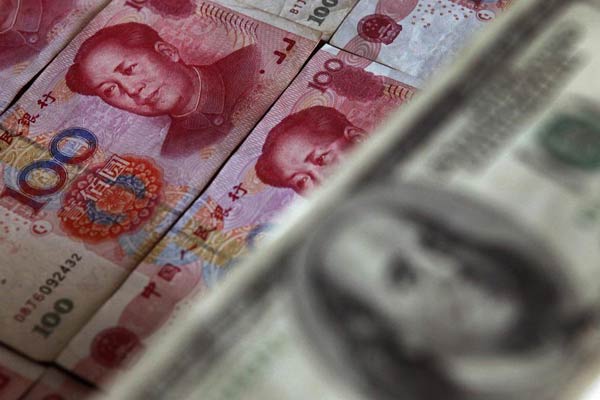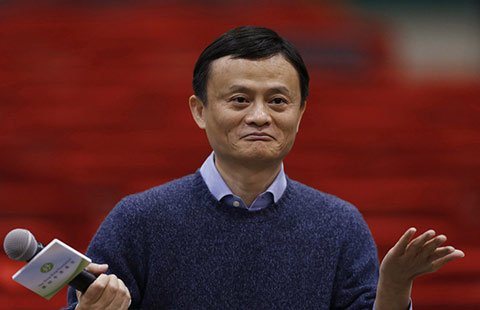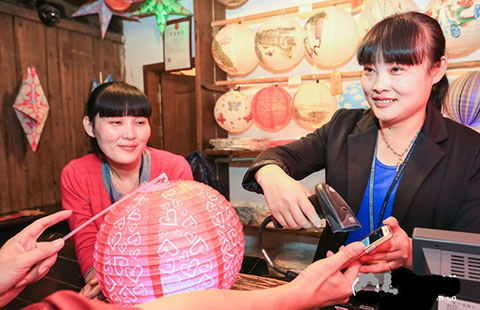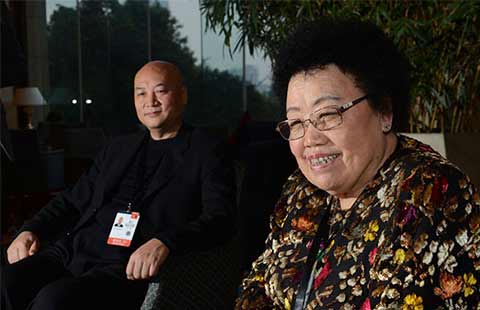RMB falls to four-year low against US dollar
By Chen Jia (chinadaily.com.cn) Updated: 2015-12-14 17:11
 |
|
A photo illustration shows a $100 banknote placed above Chinese 100 yuan banknotes in Beijing in this May 10, 2013 file photo. [Photo/Agencies] |
China's currency depreciated against the US dollar for the sixth consecutive day on Monday, falling to a four-year low on the expectation that the US Federal Reserve will hike interest rates for the first time since 2006.
The renminbi's daily reference exchange rate fell to 6.4495 yuan per dollar, a drop of 0.21 percent on Monday, according to the China Foreign Exchange Trading System, or CFETS.
The renminbi's value had dropped about 4 percent against the US dollar this year as of Monday, and it has depreciated 0.83 percent since it jointed the International Monetary Fund's Special Drawing Rights basket as one of five global reserve currencies.
After the US Fed meets on Tuesday and Wednesday, Chairwoman Janet Yellen is expected to announce the interest rate hike, adding depreciation pressure on other currencies, especially in emerging economies.
Before the potential rate hike, the Chinese central bank introduced a new effective exchange rate index on Friday, aiming to value the renminbi in a much broader context, moving away from a focus on the US dollar.
The CFETS, which was founded by the People's Bank in 1994, issued a new index that describes the relative strength of the renminbi against a 13-currency basket on a weighted average basis.
In the basket, the US dollar has the largest proportion, at 26.4 percent, following by the euro at 21.39 percent, the Japanese yen at 14.68 percent, and 10 other currencies accounting for 37.53 percent.
A statement on the central bank's website said the new index "will help bring about a shift in how the public and the market observe renminbi exchange rate movements", and it will offer a "more comprehensive and accurate way to assess market conditions".
According to the CFETS, the index takes Dec 31, 2014, as the base date, and it was 102.93 on Nov 30, meaning an appreciation of 2.93 percent from the base.
The index then decreased to 101.45 on Friday, or the renminbi appreciated by 1.45 percent against the basket since the end of 2014.
A separate statement from the PBOC said on Monday that "the index showed renminbi's exchange rate against the basket is stable".
In the medium to long term, the "renminbi's exchange rate is able to remain stable at a reasonable level", supported by the relatively higher global economic growth rate, the large scale of trade surplus, an expectation of increasing yuan-denominated asset holding by foreigners after inclusion in the currency basket and sufficient foreign exchange reserves, it said.
Paul Mackel, head of Global Emerging Markets Foreign Exchange Research at the HSBC Holding, said that the new index doesn't indicate a shift of foreign exchange policy by the central bank, but it is consistent with the eventual goal for a "clean floating" regime, or a market-denominated system, noted by Yi Gang, the PBOC deputy governor, earlier this month.
Chinese authorities have reiterated on various occasions that they are able to maintain a stable currency while preventing any financial crisis driven by unexpected capital outflows.
- China extends currency swap agreement with UAE
- China's HK, ASEAN should strengthen ties to expand offshore RMB business
- Infographics: Who, what, where of World Internet Conference
- Auto data company launches first usage-based insurance
- China's nuclear sector on path to going global
- Internet summit brings smart life to Wuzhen
- Chinese yuan weakens to 4-year low against US dollar
- China's medical tourism boom gains global attention: Experts

















